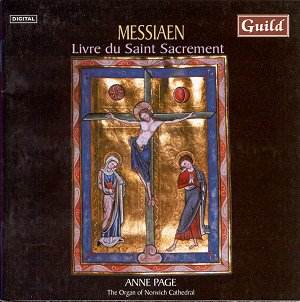As this was recorded more than two years ago, Guild
would have done well to release it a little more speedily, for it now
faces the formidable competition of Jennifer Bate, whose Unicorn-Kanchana
recording has been reissued on Regis, and Olivier Latry on DG. They
both use classic French instruments replete with the registration colours
which are so necessary for a successful realisation of Messiaen’s precise
instructions. In this context, the choice of Norwich Cathedral’s instrument
seems strange, to say the least. Not only does it lack those colours,
but its reeds are so quintessentially English (and some of them out
of tune) that they rob Messiaen’s music of much of its character and
variety. The acoustic is small: by positioning at most two imcrophones
near to the central rank of pipes Guild’s engineers have perhaps not
made as much of the building’s resonance as they could, but the faraway
sound for the opening of no.8, Institution de la Eucharistie,
is beautifully judged.
Livre du Saint Sacrement uses a vast synthesis
of Messiaen’s compositional tools to illustrate abstract concepts of
faith (Acte de foi, no.1), events and narratives central to Christian
history (the parting of the Red Sea, the Passion and Resurrection) and
living ritual (the Eucharist). The arcane complexity of Livre d’orgue
and other works from the 1950s and ’60s is jettisoned in favour of a
more emotionally direct expression which recalls his earliest works,
like La Nativité du Seigneur and L’Ascension, but
far more subtly coloured by the compositional and practical experience
gained over the intervening half-century. Its summatory character and
affirmative, celebratory outlook finds an orchestral analogue in Eclairs
sur L’Au Delà from eight years later.
Anne Page’s easy, flowing tempo for no.1 is typically
well-judged of the cycle as a whole. Occasionally she presses ahead
too hard: the ‘Puer Natus’ plainsong at the opening of no.5 is rushed,
and she makes an unconvincingly sudden slowdown to enjoy the mystical
coda of that movement.
The progress of ‘Resurrection’ through chromatic block
chords to a radiant C major recalls the same harmonic journey taken
more dourly by Apparition de l’Eglise Eternelle. Page paces it
to perfection, side-stepping criticisms of the piece’s self-indulgence
and moving surely through its extraordinary modulations until pausing
on the penultimate chord just long enough for listeners to will its
glorious resolution.
In the cycle’s centrepiece, a long narrative which
depicts the risen Christ appearing to Mary Magdalene, Page builds up
the initial tension effectively as downward figures turn on their harmonic
axis to portray confusion, hope then realisation: it’s just a shame
that the instrument’s capacity for colour can’t match Page’s skill at
drawing it out. It copes better with the contracting and expanding chords
of Murailles d’Eau, in which the Egyptians meet a watery end
as waves of dissonance pile up in choppy bursts. By keeping a tight
grip on pulse until the very end, where she eases into the crushing
conclusion, Page draws attention away from the piece’s limited material
towards the imagination of its manipulation.
The gorgeous Prière après la Communion
is the one movement in which Page relaxes, with a tempo of 6’43"
which approaches Bate’s premier recording of 7’03"; Latry is indecently
fast here at 4’18" and not even Notre Dame’s marvellous voix célestes
can stop this sounding a bit hurried. Subtitled with a quote from St.
Bonaventure, ‘You are my perfume and my delight’, this adagio of heart-stopping
gentleness can take as loving a treatment as performers will give it:
Page is just the right side of restrained. I was distracted, here as
elsewhere, by the occasional spread chord where the fingers don’t quite
come down together.
Free of the heavy reverence which belabours other performances
(Bostrom’s) and gentler than some recent versions like Weir’s and Latry’s,
this is an affecting performance in which the principal shortcoming
is the organ itself.
Peter Quantrill


